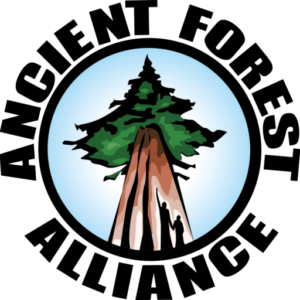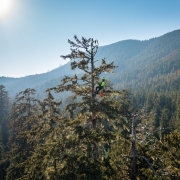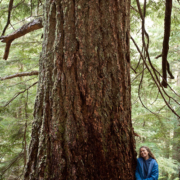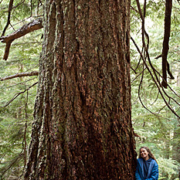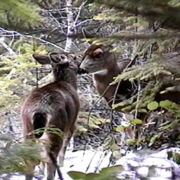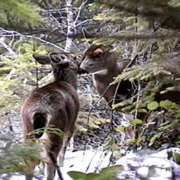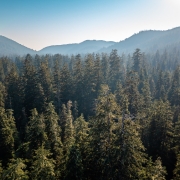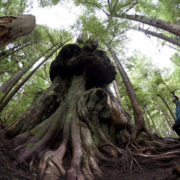PORT RENFREW, B.C.—Pink ribbons knotted to tree branches at the side of a gravel logging road mark the entry to an amazing earthly experience, something so different from anything most people have experienced it might be on another world.
The air is cool, damp and even smells green. Look up and there is no blue sky, just scraggy branches and the tops of 60-metre trees, that allow sunlight to hit the mossy ground only in broken beams of light.
This is Avatar Grove, a 50-hectare piece of untouched old-growth forest, about 110 kilometres northwest of Victoria.
Through a karma-like convergence, natural-born enemies, environmentalists, business leaders and politicians are joining hands to protect it from logging and create a nature-lover’s paradise.
It’s as if the happy-ending script is writing itself at Avatar Grove — a sequel of sorts to the Hollywood blockbuster, unfolding in the few remaining dark, moody and ancient big-tree forests on southern Vancouver Island.
“When we came across the area, it was at the same time the movie ‘Avatar’ was released,” said Ken Wu, co-founder of the Victoria-based Ancient Forest Alliance. “‘Avatar’ was about saving old-growth forests, albeit on an alien moon.
“We wanted people to make the connection that here on earth we have real spectacular old growth (forests) that are endangered and that need protecting,” he said, standing near a huge cedar marked in spray paint with the number five, signifying that it once faced a chainsaw death.
Wu said choosing the name Avatar Grove, courting the business community in nearby struggling Port Renfrew and getting the ear of the B.C. government has sparked a groundswell to declare the rugged coastal area the Big Trees Capital of Canada.
The Ancient Forest Alliance spent the summer taking busloads of tourists into Avatar Grove to see the mysterious forest, especially the alien-shaped western red cedar, nicknamed Canada’s gnarliest tree for is Volkswagen-sized burl that makes it look like something out of one of J.R.R. Tolkien’s fantasy novels.
“Port Renfrew really is the biggest trees capital of Canada,” said Wu. “The fact is the largest Douglas fir tree on earth is near town. The biggest spruce tree in Canada is also near town. The biggest tree in Canada, the Cheewaht cedar, is also north of town.
“And we’ve got the gnarliest tree at the Avatar Grove,” he said. “It’s an exceptional place for big-tree tourism and I think this is the year people are starting to recognize that and are coming to see them.”
Rosie Betsworth, Port Renfrew’s Chamber of Commerce president, agrees with Wu and the Ancient Forest Alliance that the big trees are something to see. It’s also offering a tourism boost to the community that, until recently, considered logging and fishing its lifeblood.
“The majority (here) can see the value of tourism dollars,” she said. “And now that there’s probably a handful of loggers left in this community, it is no longer a logging town.”
Betsworth said environmentalists like Wu and photographer T.J. Watt, who discovered Avatar Grove in 2009 while scouting the area’s few remaining old-growth stands, convinced locals that there is money in saving trees as opposed to cutting them down.
“For a small group of very broke guys, my God, they’ve made so much movement,” she said.
Steve Thomson, B.C.’s minister of Forests, Lands and Natural Resources, said the government halted planned logging of Avatar Grove and is awaiting the results of a public consultation process on the area’s future.
But he suggested it already appears logging is no longer a viable option.
“The province has published its intent to adjust the old-growth management area to protect that grove,” he said.
Watt said Avatar Grove and the other huge trees in the Port Renfrew area, where many hillsides are scarred from clear-cut logging, are living examples of Mother Nature’s majesty that are located steps from easily accessible roads.
“Right away we knew we had something special because I couldn’t think of anywhere else where you could see trees of this size and get there in something like a Honda Civic.”
Direct lin to article: https://www.thestar.com/travel/northamerica/article/1080406–welcome-to-avatar-forest-in-b-c
